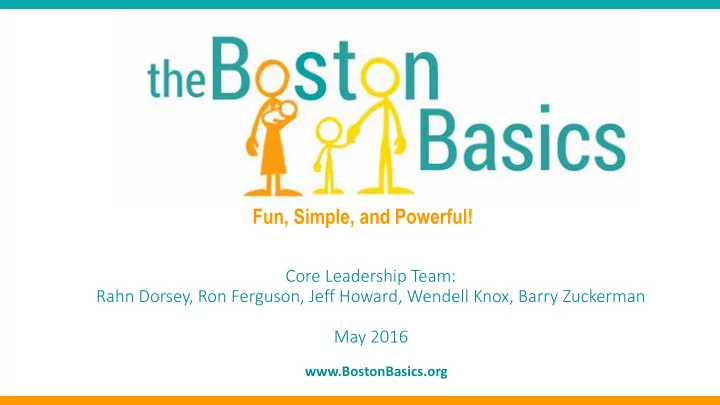

Fun, Simple, and Powerful! Core Leadership Team: Rahn Dorsey, Ron Ferguson, Jeff Howard, Wendell Knox, Barry Zuckerman May 2016 www.BostonBasics.org
Founding Organizations Boston Mayor’s Office The campaign emerged from a community process that the Black Philanthropy Fund convened. A cadre of active partner organizations is growing (see below).
Three compelling facts: 80% of brain growth happens in the first three years. Racial, ethnic, and socio-economic skill gaps are very clear in national data by the age of two. Science is clear about the types of lived experiences in the first three years that really make a difference! We face a moral imperative to act.
The Boston Basics The Achievement Gap Initiative at Harvard University convened a national scientific conference that led to a national advisory committee. The five Boston Basics components emerged from that process. The components have also been approved through a series of meetings attended by many of Boston’s leading early childhood organizations and experts. The latter group agreed that most existing early childhood work fits within the Boston Basics categories and should be unified through the Boston Basics Campaign.
Every infant and toddler needs to experience the Boston Basics Saturate the community with the Boston Basics. Make life the program! Help families experience positive reinforcements from every direction for doing the Boston Basics
Socio-Ecological Saturation Health Centers Hospitals Barbers & Beauticians Faith Based Housing Organizations Developments Schools, Museums, Child Care Settings & Libraries Community Centers
Active Partner Organizations as of April 2016 Boston Centers for Youth and Families Libraries and Museums All Community Centers Boston Children’s Museum Boston Public School Department Dudley Street Neighborhood Initiative Countdown to Kindergarten Family & Early Childhood Providers ABCD Head Start & Children’s Services Kennedy Center Boston Family Engagement Network Mattapan Family and Community Network Boston NAACP Project Hope Children’s Services of Roxbury ReadBoston Dudley Street Neighborhood Initiative South Boston Neighborhood House East Boston Family Engagement Network Thom Child and Family Services East Boston Social Centers Urban Pride Family Nurturing Center United South End Settlements
Active Partner Organizations, continued Hospitals Boston Public Health Commission Healthy Baby/Healthy Child home visitors Brigham and Women’s Hospital Boston Medical Center Children’s Hospital MGH Community Health Centers Brookside Community Health Center Codman Square Health Center Housing Dimock Community Health Center MassHousing Martha Eliot Health Center Mattapan Community Health Center Churches Southern Jamaica Plain Health Center Bethel AME Whittier Street Health Center Congregation Lion of Judah
POTENTIAL BPS COLLABORATIONS • Parent University Courses • BB Referrals to Play-to-Learn Groups • Potential Trend Analysis on Readiness Scores • Collaboration with Parent Engagement Network • Count Down to Kindergarten (already active)
Boston Basics Toolkit • Videos • Posters • Booklets • Baseline Survey on Beliefs • Train the Trainer Protocols • Parent Workshop • Facilitator Training for Parent Workshop • Website: www.BostonBasics.org • App (forthcoming)
Face-to-Face Dissemination and Supports Well-Baby Health Care Visits Adult Check-Ups Counseling Groups Home Visits Trainings for Parents, Extended Family Members, Others Prenatal Training Briefings when Leaving the Hospital with the Newborns Professional Development for Early-Childhood Caregivers Sermons Celebrations Parent Groups & Care Circles
EVALUATION Impact Metrics Research Methods 1. Beliefs and Awareness (800 done since July) A. Interrupted Time-Series (Projections of pre-implementation • Forced Choice Surveys trends serve as counterfactuals; 800 pre-implementation surveys Open Ended Questions • have been completed over six months in the Boston Promise Neighborhood) 2. Well-baby metrics. We need help from providers and advisers to B. Randomized Experimental Trials. It remains to be determined determine what is logistically and financially feasible. whether there will be opportunities to embed randomized trials into the roll out, but it should at least be possible to do comparisons that are quasi-experimental (i.e., with 3. Pre-School Readiness Scores (BPS) nonrandomized comparisons). C. Quasi-Experimental Analyses re Effectiveness of: 4. Kindergarten Readiness Scores (BPS) i. Videos and protocols that are currently under development for use by clinicians; 5. Changes in parenting behaviors ii. Other discussion group protocols; D. Descriptive and Trend Analyses. Patterns in parent self- monitoring of Boston Basics parenting behaviors reported electronically.
The English Language Overview Video (Spanish also available.)
None of us can do alone what all of us can do together. Fun, Simple, and Powerful! Join and find materials at www.BostonBasics.org Have questions? Contact Jocelyn Friedlander at 617-496-9154.
Recommend
More recommend